ACEWM’S Water Management (MSc) Students Attended Externship Program
ACEWM’S Water Management MSc. students attended a month-long Externship program in various public institutions specialized in Water Management Tasks. The objective of the program was to facilitate firsthand learning fields for the students so that they acquire empirical understanding and acclimatize operational skills related to their field of study.
ACEWM proposed an Externship program for its MSc students every year. During the 2021/22 academic year, Fourteen (14) Water Management (MSc) students from Hydrology and Water Resources, Water Quality Management, Water Supply and Sanitation, Water and Wastewater Technologies study track were involved from the externship program.
The students were assigned according to their field of study to three public institutions, namely, the Ministry of Water and Energy (MoWE), Addis Ababa Water & Sewerage Authority (AAWSA), and Ethiopian Construction Design and Supervision Works Corporation (ECDSWC).
Three students from Water Supply and Sanitation and Water and Wastewater Technology, Six students from Water Quality Management, Hydrology-, and Water Resource fields of study, and Five Water Quality Management students out of the total fourteen students participated in the Externship training program at the MOWE, AAWSA, and ECDSWC respectively.
Mr. Opoka William, an MSc student in Water Management (Water and Wastewater Technology), is one of the student who participated in a one-month Externship program at the Ethiopian Construction Design and Supervision Works Corporation.
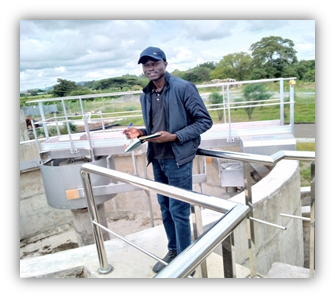
Mr. Opoka William at Ziway Federal Prison Wastewater Treatment Plant Site visiting Water Treatment Process.
The program generally helped students to acquire and develop new insight and understanding on Physiochemical and Micro-biological water quality analysis using classic and advanced techniques, Hydrological Modeling:-, Wastewater Treatment Technologies, Disinfection Processes:-,Wastewater Management, Rural Water Supply Design and Management, and Water Distribution Network Systems and Infrastructures.
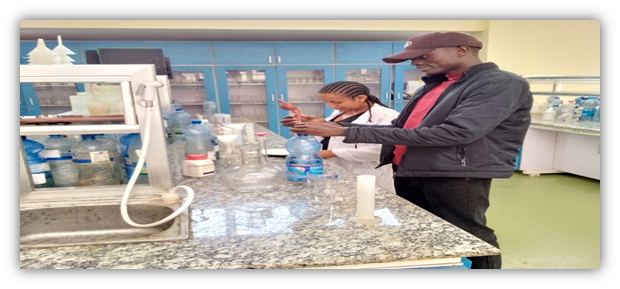
Mr. Opoka William at ECDSWC Water Quality Lab.
Mr. Opoka William, who is one of the participants stated that “The training covered Laboratory Testing Processes (Water Quality Lab) and Water Supply and Environmental Engineering Processes. In the Lab, he described, he has gained an insight into the practical aspect of water/wastewater quality parameters analysis: conventional water quality parameters, COD, BOD, Microbial analysis for total and fecal coliforms, and the use of Atomic absorption spectroscopy (AAS). In addition to the quality parameters analysis, he also acquired knowledge on how to prepare standards/reagents for water/wastewater testing. The Water Supply and Environmental Engineering Process covered the theoretical wastewater treatment plant design taking Arba Minh University Design Build Operate Wastewater and Sewer Line Project as a case study-.”
In the same vein, Ms. Nyampinga Claudine explaining the program benefits said “ she have acquired more knowledge and skills in hydrological models, broadening the knowledge she have in the class course sections. Moreover, she claimed she knew how to prepare hydro Meteorological data before applying it in a practical sense. She was able to get experience on how to get the catchment shapefile from topographical points, whereas that shapefile helps to get the digital elevation model (DEM) from STRM. The DEM is the input in ArcGIS used to delineate catchments using Arc Hydro, ArcToolbox, or ArcSWAT. She said that her stay at ECDSWC enabled her to understand more on the installations and working principles of the mentioned tools in detail. Nyampinga Claudine, sharing her story about the skills she had developed reported saying that she learned how to prepare daily observed Hydro-meteorological data column-wise by using Excel or MATLAB. Those data had some gaps of missing data due to many factors. To fill those data gaps, the Hydrognomon tool was used. She said, she have developed as skill on how to characterize the catchment by preparing the land use and land cover map and the soil type map of the taken catchment. The spatial data, meteorological data, and hydrological data were used to setup the models (the SWAT model and the HEC-HMS model) as shown below.
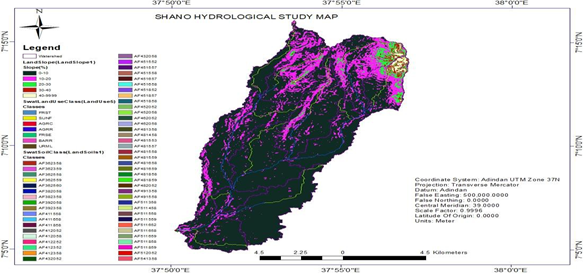
Map Shows the Output of the ArcSWAT practice conducted by Ms. Nyampinga Claudine
On the other hand, the program also created opportunities for the students to conduct scientific pieces of practices and improve their operational skills. In this regard, the students widely engaged in practicing COD and BOD Tests and Analysis, Applications of Chromatography, Preparations of Buffer Solutions, Reagents and Standards for Analysis and Instruments Calibration, Application of Global Mapper, AutoCAD, water GEMS, HEC and HMS Software Systems and Technological Tools, Preparation of Climate Date, Land Cover, and Soil Type Map and the like.
The training program has also created an opportunity for the students to visit Water Treatment Plants and distribution systems in Addis Ababa. Moreover, the students examined the national Wastewater Management Activities that are going on in 22 Cities, and also reviewed the design documents of the Wastewater Management Systems of Five Cities (Addis Ababa, Adama, Bahirdar, Awasa, and Mekele).
Amha Mikre, who is one of the beneficiaries of the Externship program, reported that the training has been helpful in bringing opportunities to thoroughly understand water supply infrastructure and distribution systems that provide potable water for the municipal city of Addis Ababa.
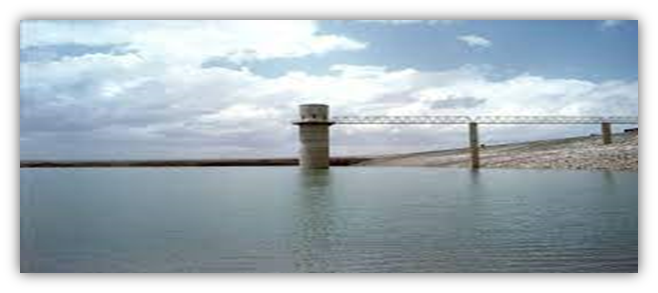
Legedadi dam one of the two dams AWSSA supply potable water for Addis Ababa City.
During the externship program, the students visited Addis Ababa Kality and Zeway Federal Prison Wastewater Treatment plants, Lamberet, Janmeda, Ras Hailu, and Teferi Mekonen Water Reservoirs and Distribution Stations, Akaki Well fields (Phase I, II, III), and Gefersa and Legedadi dams.
The externship program organized by ACEWM for MSc students is highly relevant for MSc students as students are able to observe the practical challenges of water management in the field. Finally, the students are encouraged to develop their MSc. thesis research on the identified practical challenges in line with ACEWM thematic research agenda.
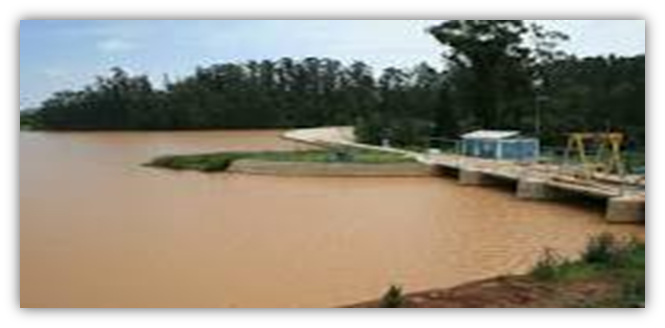
Gefersa dam which is located Thirty Kilometers North-West of the city is the second dam Addis Ababa gets its drinking water supply. The raw water from Geffersa dam is convoyed through a DN 900 steel type outlet pipe and it’s transferred from the dams to the treatment plant through one pipe.

